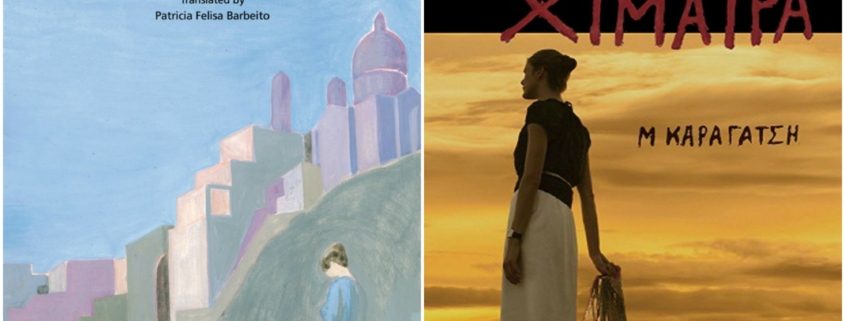The Great Chimera is a Greek Novel, which is worth it to discover, by reading it in Greek, or otherwise the translation in another language.
This Greek novel is written by M. Karagatsis and is considered a modern Greek classic. It tells the story of a young French woman, Marian, who falls in love with a Greek sea-captain, marries him, and moves with him to the Aegean island of Syros (where the Omilo summer courses take place!)
Even though it was first published in 1936, it remains an extremely timely piece of work – read below to discover more about it.
What means “Chimera”
In ancient Greek mythology, the chimera (Greek: χίμαιρα) was a mythical monster. According to the Greek poet Homer, the front of her body looked like a lion and the back like a dragon. She had three heads – a snake, a lion and a goat. Chimera would breath fire out of each of her three mouths, causing irrevocable damages to people’s crops. Chimera would eat animals as well as humans.
As a symbol in literature, the chimera stands for something that remains unrealized; the impossible, something that we didn’t manage to achieve regardless of how much effort we devoted to it.
The Greek Author Karagatsis
Karagatsis (Greek: Μ. Καραγάτσης) was the pen name of the Greek novelist, journalist, critic and playwright Dimitris Rodopoulos. The letter “M.” comes from Mitya, which is the Russian diminutive of Dimitris. The word “Karagatsis” comes from the tree karagatsi (English: elm) under the shadow of which he used to sit and write when he was young.
Karagatsis was born in Athens in 1908, grew up in Larissa and Thessaloniki, then left for France, where he studied law. Eventually, he returned to Athens where he lived until the end of this life. His writing is bold, imaginative and characterized by a unique narrative style, which is why abstracts from his novels are often studied by Greek students.
What is the story about?
The Great Chimera tells the story of Marina, a young and beautiful French woman who lives in Rouen. Keen to escape the painful past of her family and the narrow-mindedness of her social circle, she meets and falls in love a Greek sea-captain, Yannis. She follows him back to his home in Greece, the Cycladic island of Syros, to begin a new life as a married woman.
Marina is mesmerized by the beauty of her surroundings and quickly decides to immerse herself as much as possible in contemporary Greek culture, in an attempt to become Greek herself. As her husband sets out to further travels, she is left behind to live with her strict, formidable mother-in-law and her husband’s brother, Minas, with whom she eventually falls in love.
To add to this, the balance of her little world is disrupted as her husband’s shipping business is struck by disaster, bringing an end to their comfortable life.
Karagatsis’ novel circles around two literary themes – love and death. Set at the beginning of the 20th century, The Great Chimera is a detailed account of the inner life of the heroine and talks about the type of love that can cause mayhem and disaster. It is thus, in a way, a modern Greek tragedy.
The Great Chimera has been made into a TV series and a highly acclaimed stage play that was performed both in Athens as well as internationally.
Click here to see the trailer of the play
Is this book translated in English?
Yes it is ! So, if you’re an advanced student in Greek, you could have a go and test your reading comprehension skills by reading the original.
In that case, you can also read the Greek Blog article. (see link on top)f
However, if you’re not so advanced in Greek yet , but you are interested in Greek literature, then the English translation is perfect
+++++++++++++++++++++++++++++++
PS. Good to Know!
If you would like to learn more about Greek literature, novels and authors, from 1880 till of today,
take a look at this interesting eBook “Journey into Modern Greek Literature”
+++++++++++++
If you are in the beginning stages of learning Greek,
your very first Greek book to read could be this Greek Easy Reader “Lydia”,






